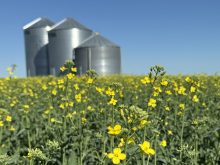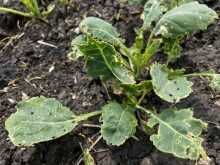On the positive side, the number of venture capital firms in Canada specializing in agriculture and agri-food is growing
Two years ago, investors and venture capital firms were dumping billions into agriculture and agri-food technology.
Money was flowing toward start-up companies developing plant-based “meat”, biological control of crop pests, field sensors and technology to track food back to the farm.
That’s just a partial list.
To generalize, ag and food tech was hot.
In 2023, things have cooled off.
“Over the first three quarters of this year, ag tech startups have secured US$4.6 billion in funding. In comparison, they raised $10.7 billion last year and $12.2 billion in 2021,” Croplife.com reported in mid-October.
Read Also

Rural Manitoba resources slim on natural disaster planning
A study from Brandon University’s Rural Development Institute has found that many rural and small municipalities don’t have the staff or resources to make formal climate plans against natural disaster.
“In 2023, ag tech startups are trending towards venture investment levels like those in 2020, when the global economy was disrupted by COVID-19.”
If the slide continues for the rest of 2023, investment in ag tech could drop 35 to 40 percent compared to 2022.
AgFunder, an investment firm in San Francisco, noted a similar trend in its 2023 Global Agri-Food Tech Investment Report.
The data was for 2022 but it showed a decline in venture capital for agriculture and food technology.
“Global investment in foodtech and agtech startups totalled $29.6 billion in 2022, a 44 percent decline on record-breaking 2021 levels,” AgFunder said.
The drop in investment is directly related to the stock market.
Data shows that 2022 was one of the worst years for equities since the financial market meltdown of 2008. From the beginning to end of 2022, the S&P 500 dropped about 20 percent.
As a result, firms that invest in ag and agri-food technologies are feeling poorer and less confident than they did in 2021, which means investors and venture capital firms have become more careful with their money.
The lack of cash available for ag-tech spills over into Canada and affects Canadian entrepreneurs.
On the positive side, the number of venture capital firms in Canada that specialize in agriculture and agri-food is growing.
“I think it’s getting better…. Probably in the last four to five years, we’ve had 10-12… groups show up, raise money and start doing deals in Canada,” said Joe Dales, co-founder of RHA Ventures Inc., an Ontario firm that invests in early-stage innovative companies in the agriculture and food sectors.
Dales spoke at the Agriculture Enlightened conference, held Oct. 26 in downtown Winnipeg.
The host and organizer of the conference was EMILI — an organization helping Canada become a leader in digital and precision agriculture.
The Canadian market is ripe for ag tech investment, thanks to the 73 cent loonie and the proximity to the massive U.S. market, Dales said.
He added that Farm Credit Canada has played a critical role in expanding ag and agri-food investment within Canada.
“They have funded a bunch of ag tech, venture capital funds in the last few years,” he said.
“Without them stepping on the playing field, it would be very disappointing in Canada.”
















